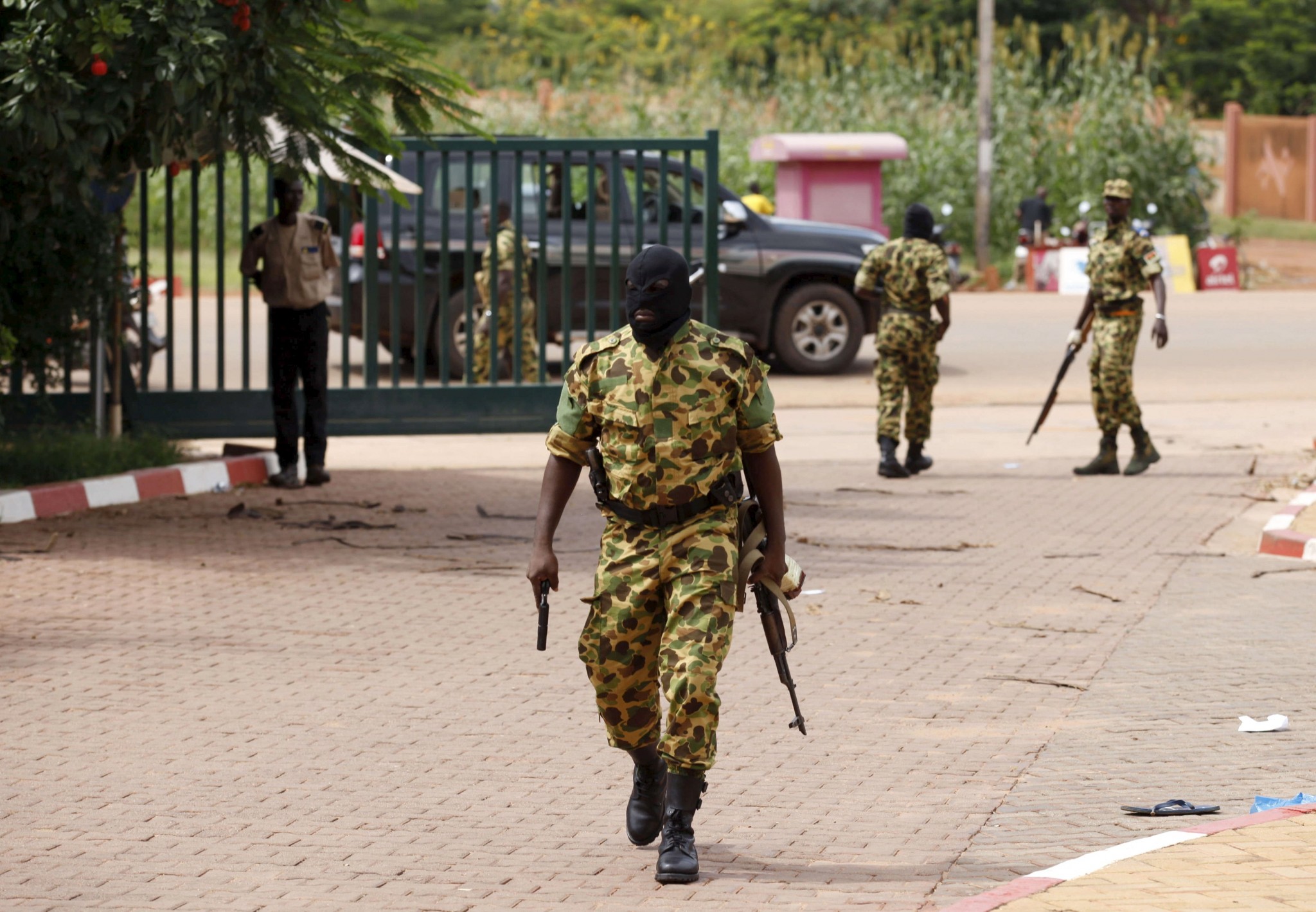Burkina Faso soldiers marched into the capital Ouagadougou without resistance late on Monday as army leaders began surrender talks with the elite presidential guard that staged a coup against the government last week.
Burkina Faso had been preparing to head to polls on Oct. 11 for a vote aimed at restoring democracy after last year’s overthrow of longtime leader Blaise Compaore when the 1,200-member unit took the interim president and several cabinet ministers hostage on Wednesday.
Military convoys from regional centers drove towards the capital Ouagadougou on Monday, cheered along by residents opposed to last week’s military coup. Some units entered the city center while others remained on guard at strategic entry points, residents said.
“The RSP (presidential guard) is now negotiating the conditions of its surrender to the head of the army,” said a senior military source involved in the operation, referring to talks under way in Ouagadougou’s Camp Guillaume Ouedraogo.
A statement signed by several military chiefs earlier said the regular armed forces were seeking the surrender of the presidential guard, known as the RSP, “without bloodshed”.
“We ask them to immediately lay down their arms and go to Camp Sangoule Lamizana,” read the statement, referring to a barracks in Ouagadougou. “They and their families will be protected.”
In an apparent gesture of appeasement, coup leader General Gilbert Diendere reacted in a statement, saying he would free Prime Minister Yacouba Isaac Zida and pledged to hand power to an interim government.
“We pledge to work for the cohesion of the army (and) present our apologies to the nation and the international community,” the former spy chief said on state television on Monday evening.
In what may have been a foiled plot to whisk Diendere out of the country, Burkina Faso’s main airport denied a Togolese airplane permission to land, a control tower official said.
“Homeland or death!”
In a sign of his growing isolation, Diendere received a stern warning from Francois Hollande, president of Burkina’s former colonial ruler France.
Hollande called upon the coup participants to immediately lay down their weapons and hand power over to legitimate authorities “or assume all of the consequences”, the French presidency statement said.
He also announced the suspension of financial and military aid to Ouagadougou until the transitional government was restored.
France’s position was echoed by the heads of state of neighboring Niger and Chad, who called upon the presidential guard to disarm and return to barracks.
Soldiers from the presidential guard were largely absent from Ouagadougou’s streets for the first time since Wednesday’s coup, and as night fell hundreds of people defied a nighttime curfew put in place by the coup leaders last week.
It was not immediately clear where Diendere was late on Monday. But rumors that he was preparing to step down at the residence of the Mogo Naaba, the traditional leader of the Mossi people, attracted a jubilant crowd of at least a thousand people onto the street outside.
“The homeland or death! We will be victorious!” they chanted.
Interim President Michel Kafando, who was taken hostage in the coup and then placed under house arrest, sought protection in the French ambassador’s residence in the capital on Monday.
Analysts had earlier warned of possible bloody clashes.
“The presidential guard has most of the weapons, but the army has the numbers,” said Cynthia Ohayon, West Africa analyst with conflict resolution think tank, the International Crisis Group. “This could really end in a bloodbath.”
France told its residents in the country to stay indoors while the U.S. state department advised citizens to leave the country as soon as possible. Last week at least 10 people were killed amid street clashes, most from bullet wounds.
Failed mediation
Mediators from the West African bloc ECOWAS had on Sunday announced a draft agreement aimed at ending the crisis that was to be presented to regional heads of state at a summit in Nigeria on Tuesday.
However, the ECOWAS proposal, which included an amnesty for the coup leaders, was swiftly rejected by civil society and opposition politicians, who said they had not been informed of the document’s contents before they were announced.
In his first public statement since he was ousted, interim president Kafando also rejected the proposal.
“I was not associated with the negotiations at Hotel Laico … It does not take into account the interests of the Burkinabe people,” he told French RFI radio.
Nigeria’s President Muhammadu Buhari was due to hold an extraordinary summit on Burkina Faso in Abuja on Tuesday.
Demonstrators protesting against the last ECOWAS deal erected barricades and burned tires in several neighborhoods across Ouagadougou throughout the day on Monday, and large protests also took place in several other towns.
As most of the capital’s residents abandoned the streets and sought refuge at home upon hearing news of the approaching troops, young men opposed to the coup remained at improvised roadblocks waiting for the soldiers’ arrival.
“We don’t agree with what ECOWAS decided,” said protester Ahmed Zio in the Zone One neighborhood. “We don’t want an amnesty for the general and his putschists. They are terrorists. We don’t want to hear about the RSP any more.” Reuters






 WhatsApp us
WhatsApp us 

